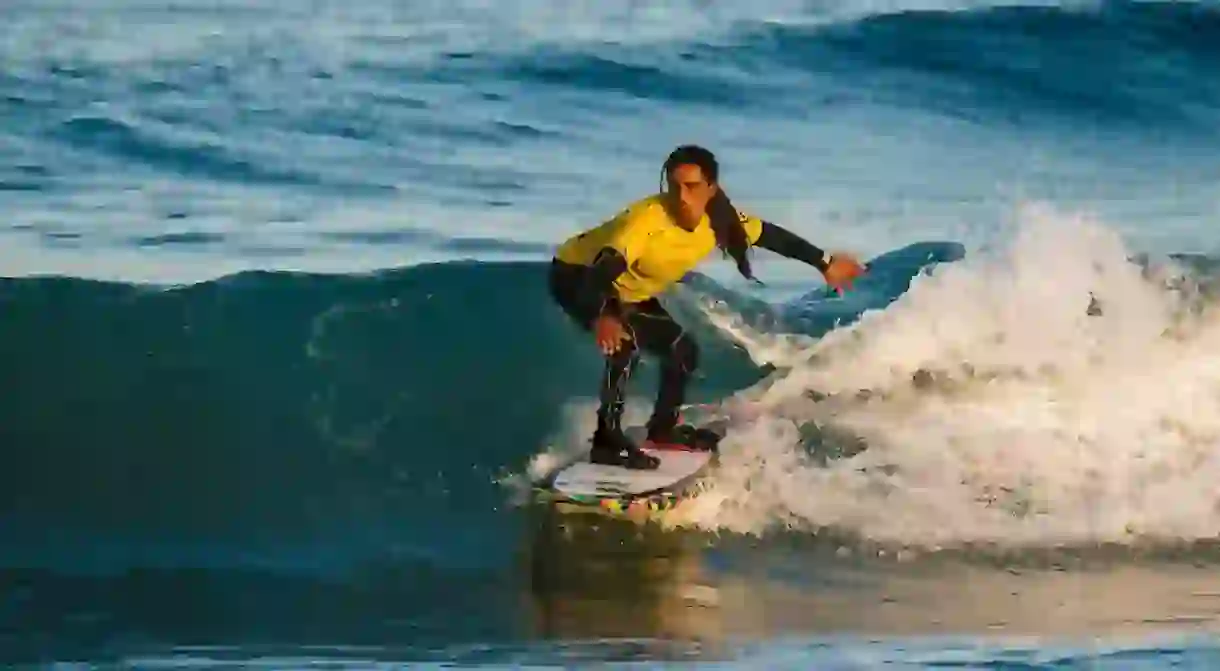This Organization Helps Physically Disabled People Surf in Costa Rica

Surfing is an experience that many surfers claim to be healing, cleansing, meditative, spiritual, and totally bliss-provoking. For those with physical disabilities, the idea of experiencing these positive effects from the ocean may seem tricky. Fortunately, there are programs around the world that help bring surfing to those who may not have easy access otherwise. Find out how this organization in Costa Rica offers surfing to variously abled people.
What is adaptive surfing?
Adaptive surfing modifies the sport in order to accommodate various physical limitations. Modifications may include riding a wave in a kneeling or prone position, sitting on a wakeski, or surfing in a non-standing position with paddle assistance, and other variations. Sometimes there is a modification made to the actual surfboard, while other times the modification manifests as another person in the water assisting with paddling and other specific needs. Adaptive surfing can aid both those who become physically disabled and those who were born with a physical disability.

What is the ISA, and what have they done for Adaptive Surfing?
The International Surfing Association (ISA) was founded in 1964 and is recognized as the World Governing Authority of Surfing. There are 103 countries on five continents that are part of the ISA National Federation. The ISA has taken “an active role in the development and advancement of Adaptive Surfing to create a global platform for universal access to the sport and enable Adaptive Surfers the opportunity to achieve sporting excellence and inspire others.”
While the ISA didn’t pioneer adaptive surfing, they certainly helped bring it to the global stage. In 2015, the ISA organized the first international World Adaptive Surfing Championship (WASC), which according to associate membership and development manager Alex Reynolds was the catalyst for the growth of Adaptive Surfing around the globe. Last year’s WASC included 109 athletes from 26 countries.
Reynolds explains that one of the major goals of the ISA World Adaptive Surfing Championship is to “unify adaptive surfing efforts around the globe and create an international platform for surfers with physical disabilities to display their talents in competition. A key outcome was that in many cases the adaptive surfers in various countries then became connected with their National Surfing Federations which led to increased growth and development of the sport and more opportunities on a national level.”

How did Adaptive Surfing reach Costa Rica?
Ismael Araya began using a wheelchair after a severe and hospitalizing motorcycle accident. Gustavo Corrales helped his dear friend get back into the ocean, since it was surfing that helped Araya connect with himself. The strategy was clearly effective — the following year, in 2015, the Costa Rica Surfing Federation sent Corrales and Araya to the World Adaptive Surfing Championships in California to represent Costa Rica.
Araya was also invited to speak at the Symposium in La Jolla, California, where he told the audience, “I hope to bring hope.” Upon hearing those words, Corrales experienced a heartfelt urgency to act and decided at that moment to bring Adaptive Surfing to Costa Rica. Corrales took his inspiration and co-founded the Asociación de Surf Adaptado de Costa Rica. Corrales and Araya returned to California in 2016 for the next WASC with four more athletes, and then again this past year with eight more athletes, four coaches, and four assistants.

What is the Asociación de Surf Adaptado de Costa Rica?
Corrales explains that the Asociación de Surf Adaptado de Costa Rica “is a non-profit organization focused on the inclusion, empowerment and integral development of people with disabilities in surfing, which seeks to grow this sport in a therapeutic, motivational, recreational and supportive way, developing technical structures and platforms to prepare high performance adaptive surfing athletes. For us, this team and all the future ones are of vital importance to fulfill our mission to bring quality of life to people with disabilities and to represent our country with a team of great humans and quality professionals.”
The Costa Rica Adaptive Surfing team describes themselves as a family and goes by the name “Los Hijos de lo Imposible,” or The Children of the Impossible. This family includes a visually impaired surfer, several wheelchair surfers, others with prosthetics, as well as many others with various physical disabilities. They all share a love of surfing and are passionate about competing. Corrales’s hope for the Costa Rica national team is “to be an inspiration to others, to encourage self-improvement and growth, to strengthen the team, and to one day win the World Adaptive Surfing Championship.”

Surf with the Asociación de Surf Adaptado de Costa Rica
Outside of the competitions, Corrales and his team of qualified and specially trained surf instructors offer lessons, training, and surf therapy to any interested individuals living in or visiting Costa Rica. They are currently in the process of finalizing all of the legalities and formalizing their protocols so that they’re better able to serve the community in Costa Rica and the international community who want to surf while in Costa Rica.














